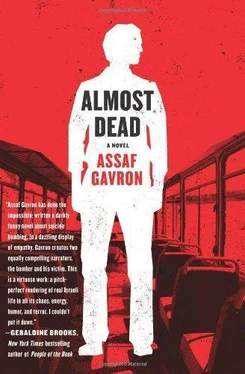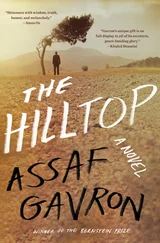‘Lost ground can be regained — lost time never.’
Franklin Delano Roosevelt

I climbed aboard the Little No. 5 as I did every morning on my way to work. ‘Little No. 5’ is what I call the minibus-sized cab which follows the route of the No. 5 bus. It’s actually a cross between a bus and a cab. You get the best of both worlds — the familiar route and the cheapness of the bus, but they’ve got the speed of a cab and you can hail them and get off where you like.
And since there were bombs all the time, I only ever took Little No. 5s to work and back. Even if a real No. 5 arrived at my stop before a Little No. 5 I let it pass. A bus was too easy a target for a terrorist — especially the No. 5, which was almost always full and had already been bombed. I wasn’t really all that sure about doing this, but Duchi made me swear never to take the bus. And they were never going to bomb a Little No. 5. For one thing, they can only take ten people, eleven with the driver. Plus there’s only the one door, at the front, so the driver can see exactly who gets on board.
That day I got on at the usual place. The time was around nine in the morning. A pale midwinter sun was hanging in a translucent sky; wet leaves covered the boulevard.
The driver was Ziona. She was the only woman driver in the Little No. 5 fleet but she was no pushover. She was always yelling down the radio at the dispatcher in the office, complaining about some guy who’d dared to overtake her or cut her up, or wondering how the hell that Jumbo had gotten so far ahead of her. A Jumbo’s a bus, in the Little No. 5 drivers’ dialect. The dispatcher was always telling her to shut up and stop hogging the frequency. Maybe she ought to chill out? Maybe she ought to stop drilling a hole in everybody’s head, including the heads of the passengers?
And Ziona would take a drag from the cigarette she liked to hang outside her window and whisper to herself as she exhaled, ‘Oh, ffffuuuckk your fucking hole in the head!’
We were heading down Dizengoff Street when an elderly lady turned to me. Quietly she said: ‘Doesn’t that man look suspicious?’
With her eyes she indicated a dark guy at the front. We were sitting at the back. He was wearing a grey wool hat and holding a suit in a suit bag.
‘Come on, don’t exaggerate,’ I said. ‘He looks fine to me.’
But I kept looking at him. I thought about the fact that explosive belts were the latest thing — the flavour of the month. Explosive belts must be pretty flat if you can strap them round your body. Just possibly there was one in his suit bag.
‘Don’t you worry about it,’ I told the old lady. ‘It’ll be fine.’
She gave me a sour look and tried another guy who was sitting at the back with us. She whispered something in the other guy’s ear, and he looked towards her suspect and a second later shook his head and flapped his hand. Now I was certain. Just paranoid. Why is everyone so paranoid in this country? Can’t dark guys get on buses with suit bags any more?
The old lady called over to Ziona.
‘Can I get off at the next corner?’
Ziona looked in the mirror with her big eyes. ‘Of course you can, honey,’ she said. Ziona was a nice woman. She had short hair and wide shoulders. She’s dead now, of course. ‘You talking to me, Yossi?’ she jabbered into the radio. ‘Hey, who’s that? You got a driver called Morris next to you? Morris, the driver of Seventy?’ Yossi didn’t answer. Another driver was saying, ‘Hey, what is this, the cemetery? We got no passengers today? Ten minutes and nobody gets on.’ Someone else was saying, ‘At least you get to see some of these chicks’ bellies…’ and Yossi cut across them: ‘Will you cut this crap out! Ziona, you’re doing it again, and everyone else piles in after you with their chatter.’ Ziona swore to herself. The radio was tuned to a news show. They were talking about a bomb in Wadi Ara. The passengers were listening quietly. Then there was a song.
The old lady got off at Jabotinsky Street. She didn’t trust our judgement. On her way out she gave the dark guy a long look. He looked back at her. I didn’t think at that moment that his look meant anything. If I did have a sneaking suspicion that she might have a point, that I ought to get off too, just to be on the safe side, I blotted it out immediately. I didn’t have time for the safe side. Who has?
‘Everyone’s under pressure, eh?’ the other guy at the back said. He had a little goatee and big aviator sunglasses with mirrored lenses. His hair was the colour of honey, held back with plenty of gel, darkening into curls at the back. Cool, at least in his own eyes. Pleasant smile. Giora, I know now. Giora Guetta, from Jerusalem. I know plenty of things now.
‘This paranoia…’ I said. ‘People are completely crazy.’
‘He looks OK to you, right?’
I looked once more towards the dark guy. I wasn’t sure. Who could be sure?
‘Yeah, no problem with him,’ I said.
Each of us looked through his window. Winter, but the sun was out. I watched the tree-lined canyon of Dizengoff slide by, the parade of designer clothing shops, an ad for the movie Monsters Inc. , a small Gad Dairy truck passing. A builder got on and started shouting at Ziona.
‘Why didn’t the last two stop for me?’ The builder was the father of two girls. I read it later on Ynet.
‘Don’t get mad, honey,’ Ziona said. ‘They were probably full.’
‘Come on, people, my time is precious,’ the builder said.
‘Everybody’s time is precious, honey.’
If there’s one thing I like about the Little No. 5s, it’s their efficiency with time. I know something about this: I work in the business of time. For example, all the handling of money and change is done during the ride, not like on the bus, where everyone’s got to finish paying while it’s still standing at the stop. You give someone sitting in front of you some money and they pass it down, from passenger to passenger to the driver, and your change comes back up, from hand to hand back into your palm. Money circulating efficiently from stranger to stranger, like the bus’s blood. Or the way the drivers change money with other drivers: they arrange it over the radio, and when they pass each other they’ll stop for a couple of seconds and, one-two, it’s done. Or their skill on the road — the way they improvise, overtaking cars and Jumbos by driving on the other side of the road, stealing valuable seconds at traffic lights, avoiding traffic jams by cutting through narrow streets off their usual routes: decisive actions. It’s a pleasure to watch them.
Somebody touched my shoulder. I looked up in alarm and saw it was only the guy in the mirrored shades, with a PalmPilot in his hand. I thought to myself: what are you showing off for? I’ve got a Palm too. Actually, that wasn’t entirely true. My Palm had stopped working a couple of months before.
‘Listen,’ he said, ‘if something happens to me, I want you to tell my girlfriend in Jerusalem, Shuli — I want you to tell her…’ He was thinking, but he couldn’t seem to find the right words. I chuckled. What was he talking about, if something happened to him? Him too? The old lady, OK, she’d probably been paranoid since the Holocaust, but him?
‘If something happens,’ I said, ‘I’m hardly going to be the one left to pass on messages, am I? Don’t worry, man, nothing’s going to happen.’
Читать дальше













